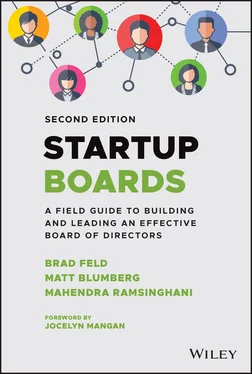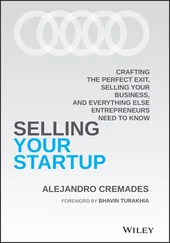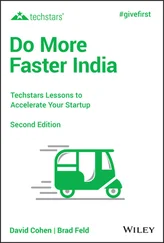Brad Feld - Startup Boards
Здесь есть возможность читать онлайн «Brad Feld - Startup Boards» — ознакомительный отрывок электронной книги совершенно бесплатно, а после прочтения отрывка купить полную версию. В некоторых случаях можно слушать аудио, скачать через торрент в формате fb2 и присутствует краткое содержание. Жанр: unrecognised, на английском языке. Описание произведения, (предисловие) а так же отзывы посетителей доступны на портале библиотеки ЛибКат.
- Название:Startup Boards
- Автор:
- Жанр:
- Год:неизвестен
- ISBN:нет данных
- Рейтинг книги:3 / 5. Голосов: 1
-
Избранное:Добавить в избранное
- Отзывы:
-
Ваша оценка:
- 60
- 1
- 2
- 3
- 4
- 5
Startup Boards: краткое содержание, описание и аннотация
Предлагаем к чтению аннотацию, описание, краткое содержание или предисловие (зависит от того, что написал сам автор книги «Startup Boards»). Если вы не нашли необходимую информацию о книге — напишите в комментариях, мы постараемся отыскать её.
Startup Boards: A Field Guide to Building and Leading an Effective Board of Directors
Startup Boards
Startup Boards — читать онлайн ознакомительный отрывок
Ниже представлен текст книги, разбитый по страницам. Система сохранения места последней прочитанной страницы, позволяет с удобством читать онлайн бесплатно книгу «Startup Boards», без необходимости каждый раз заново искать на чём Вы остановились. Поставьте закладку, и сможете в любой момент перейти на страницу, на которой закончили чтение.
Интервал:
Закладка:
We also wrote this book for management teams. Most management teams are directly exposed to the board and interact with them regularly. Some participate in most board meetings, while others are called in to provide an update or explain a situation. Bringing management team members into a board meeting can be extremely helpful or completely disruptive. The responsibility for an effective relationship between board members and management team members belongs to the board members, the CEO, and the management team alike.
Finally, we include specific advice and guidance for an aspiring board member. Serving on a board is a meaningful career objective, but the challenge of getting on your first board is non-trivial. In addition to learning how to function effectively on a board, we help you learn how to be a compelling prospective board member.
Throughout this book, we've incorporated advice and stories from investors, board members, entrepreneurs, and executives whose views we respect. While we provide guidance and tools, we continuously learn, so follow our blogs and the startuprev.comwebsite for things we have learned, new experiences, and experiments.
Magic Words, Phrases, Abbreviations, and Style
Having written several books, we've learned the importance of being precise with particular words and phrases. The following are several magic words with their synonyms and abbreviations.
Angels: We include “friends and family” and “seed” investors in the definition of an “angel investor” and shorten the phrase to “angels.” These are early investors in a company who are investing their own money. We don't include “seed-stage venture capitalists” in this category.
Board: We'll start abbreviating “board of directors” as “board.”
Board member, director: We use these words interchangeably.
CEO: The CEO can be one of the founders, but it doesn't have to be. Occasionally we'll refer to “founder/CEO” when this is an important distinction.
Chair: While “chairman of the board” sounds serious and weighty, there are plenty of “chairwomen.” We prefer to use “chair” since it's gender-neutral. While in some sections we refer to a lead director, they play a similar role to a chair.
Entrepreneur, founder: We use these two words interchangeably. To us, they mean the same thing.
Lawyer, outside counsel: While we use these words interchangeably, we generally refer to outside counsel. If we refer to a lawyer who works for the company rather than an independent law firm, we'll call them “general counsel.”
VC, investor: We abbreviate “venture capitalist” as “VC” and are referring to a person, not an entire firm (which we call a “VC firm”). It also takes the letter count down significantly. We also use VC and investor interchangeably.
After much debate and discussion with other writers and editors, we decided to use the Singular they 1 as our primary pronoun, unless we referred to a specific person.
One of the challenges with this book is writing it for a broad range of readers, including founder/CEO, non-founder CEO, VCs, the management team, independent board members, and aspiring independent directors. To avoid confusion, we address the advice in the book to the CEO, except for Section Six. When we discuss situations that only apply to a founder/CEO, we clarify that. Regardless of who the reader is, we refer to a CEO when saying “You.”
Whenever we have a list of things to explain to support a point, rather than weaving seven paragraphs into the text with lots of transitional phrases, we start each paragraph with a bold bulleted summary of the point we are making. Having read 17,325 business books, we wish more authors would use this approach to make it easier to summarize and skim key points on a topic.
Whenever we refer to another person in the book, we'll include their credentials in parentheses the first time we mention them. In later references, we only list their name.
We've written this book together. While we each had different experiences, we felt using one voice would be more effective. We'll often refer to one of us in the third person. You're familiar with this approach if you've read the book Startup Life: Surviving and Thriving in a Relationship with an Entrepreneur (2013) that Brad wrote with his wife, Amy Batchelor.
Okay, let's begin.
Note
1 1.See Khan Academy's excellent presentation on this at https://www.youtube.com/watch?v=f21t7DRKlg8. Wikipedia has an extensive discussion at https://en.wikipedia.org/wiki/Singular_they. And the American Psychological Association (APA) Style guide has a clear explanation at https://apastyle.apa.org/style-grammar-guidelines/grammar/singular-they.
Chapter 2 The Board's Purpose
Why have a board of directors in the first place? What do they do? How big should they be? Do you even need one?
A board is legally required the day you incorporate your company. Frequently, the board consists of the founders, or even just one founder, until a startup receives outside financing.
Waiting to build a board is a mistake.
Your board can be a powerful strategic asset. If you choose the right directors, build and manage your board effectively, and actively engage your directors, the board can help you dramatically accelerate your business. When you run into trouble, which all startups inevitably do, the board can help guide you through the tough spots. As Jeff Lawson of Twilio is fond of saying, “As the founder and CEO, I get to build two teams to help me—my leadership team and my board.”
Clint Korver (Ulu Ventures, Partner), who used to teach a course at Stanford University titled “Startup Boards: Advanced Entrepreneurship,” says, “The most common mistake startups make is not having a board at all.” Clint points out that research shows that most startups fail due to self-inflicted wounds, including internal decisions about founding team roles and equity allocations. “Founders who are overconfident or choose to avoid conflict often miss an opportunity to bring in fresh perspective with input from appropriate individuals,” says Clint.
Depending upon the stage of the company, three kinds of boards exist: (1) a working board; (2) a reporting board; or (3) a lame-duck board. Ideally, for a startup, a working board is best as the board members don't pontificate, ask mindless questions or just show up for meetings relatively uninformed. Instead, they focus on the critical challenges of a company.
Accountability
In Startup CEO (2020), Matt wrote that the fundamental reason boards exist is that “everybody needs a boss.” For many founders, one of the reasons to create a startup is to get away from having a boss. Unless you own 100% of your startup, are a solo founder, have no intentions to ever grant or sell equity to anyone, and don't think you benefit from anyone else's experience and knowledge, you're accountable to others. Even then, you're still accountable to stakeholders, including employees, vendors, and customers.
The board ensures that the interests of all shareholders and other stakeholders are considered. In many startups, the primary shareholders and board members are the same. As companies grow, outside board members who aren't involved in the business and don't have a significant economic stake are added to the board. Collectively, this group is responsible for considering and balancing the interests of all shareholders.
Accountability is a powerful construct. Consider how effective you are at dieting or exercising on your own. Are you more effective if you have a nutritionist, trainer, coach, or friend to whom you're accountable? Regardless of how much you enjoyed your favorite class in college, how many papers would you have written if your professor hadn't assigned them and given them due dates? While it's possible to be completely self-taught and highly disciplined in elements of your life, it's rare to maximize your success without help, support, and accountability.
Читать дальшеИнтервал:
Закладка:
Похожие книги на «Startup Boards»
Представляем Вашему вниманию похожие книги на «Startup Boards» списком для выбора. Мы отобрали схожую по названию и смыслу литературу в надежде предоставить читателям больше вариантов отыскать новые, интересные, ещё непрочитанные произведения.
Обсуждение, отзывы о книге «Startup Boards» и просто собственные мнения читателей. Оставьте ваши комментарии, напишите, что Вы думаете о произведении, его смысле или главных героях. Укажите что конкретно понравилось, а что нет, и почему Вы так считаете.












